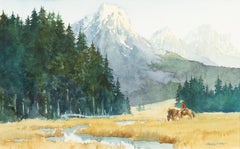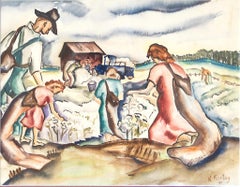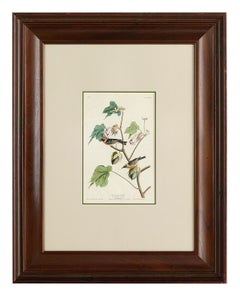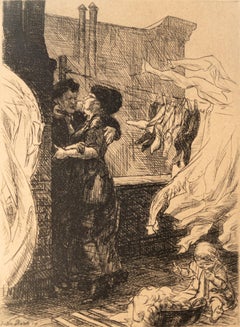Want more images or videos?
Request additional images or videos from the seller
1 of 5
Bart LindstromIndoor Plumbing
$600List Price
About the Item
- Creator:Bart Lindstrom
- Dimensions:Height: 15.5 in (39.37 cm)Width: 21 in (53.34 cm)
- Medium:
- Movement & Style:
- Period:
- Condition:
- Gallery Location:Austin, TX
- Reference Number:Seller: RS-26512-201stDibs: LU117129826752
About the Seller
4.9
Platinum Seller
Premium sellers with a 4.7+ rating and 24-hour response times
Established in 1964
1stDibs seller since 2019
135 sales on 1stDibs
Authenticity Guarantee
In the unlikely event there’s an issue with an item’s authenticity, contact us within 1 year for a full refund. DetailsMoney-Back Guarantee
If your item is not as described, is damaged in transit, or does not arrive, contact us within 7 days for a full refund. Details24-Hour Cancellation
You have a 24-hour grace period in which to reconsider your purchase, with no questions asked.Vetted Professional Sellers
Our world-class sellers must adhere to strict standards for service and quality, maintaining the integrity of our listings.Price-Match Guarantee
If you find that a seller listed the same item for a lower price elsewhere, we’ll match it.Trusted Global Delivery
Our best-in-class carrier network provides specialized shipping options worldwide, including custom delivery.You May Also Like
Mid Century Modern Mixed Media Painting -- Day at the Beach
Located in Soquel, CA
Wonderful mid century mixed media coastal/figurative in loose/painterly style by Irmal Gertrude Attridge (American, 1894-1962), circa 1950. Signed lower right. Presented in vintage frame under glass (included as-is). Image size: 9"H x 12"W.
Irma Gertrude Attridge was born in Chicago and studied at Chouinard Art Institute in Los Angeles with Henry McFee and Oscar Van Young. Member of Calif. AC; AEA; Cal. WC. Soc.; Women Painters...
Category
1950s American Realist Landscape Paintings
Materials
Ink, Watercolor, Color Pencil, Laid Paper
$800
H 13.82 in W 16.25 in D 0.5 in
Colonel Bates Leads the 30th Colored Infantry at the Battle of the Crater
By Abbott Fuller Graves
Located in Costa Mesa, CA
Colonel Bates Leads the 30th Colored Infantry at the Battle of the Crater
Watercolor on Paper Circa 1903
15 ½ x 21 ½ Inches 25 ½ x 33 ½ Inches Framed
LR: Graves
This rare portrait of African American troops serving in battle during the Civil War depicts the 30th United States Colored Infantry at the Battle of the Crater, at Petersburg, Virginia. The regiment was composed of African American enlisted men commanded by white officers and was authorized by the Bureau of Colored Troops which was created by the United States War Department on May 22, 1863.
The Battle of the Crater, July 30th, 1864, was part of the Siege of Petersburg, fought between the Confederate Army of Northern Virginia, commanded by General Robert E. Lee and the Union Army of the Potomac, commanded by Maj. Gen. George G. Meade (under the direct supervision of the general-in-chief, Lt. Gen. Ulysses S. Grant).
At the top of the painting, Colonel Delevan Bates raises his saber to lead the charge of the 30th United States Colored Infantry. Bates was promoted to this command just prior to this battle, having served with distinction in the 121st New York Infantry at the Battles of Fredericksburg, Chancellorsville and Gettysburg. Though the Battle of the Crater would eventually be won by the Confederacy, it was here that Bates and 23 other troops would be award the United States highest award for bravery during combat, the Medal of Honor.
After weeks of preparation, on July 30, Union forces exploded a mine in Maj. Gen. Ambrose E. Burnside's IX Corps sector, blowing a gap in the Confederate defenses of Petersburg, Virginia. From this propitious beginning, everything deteriorated rapidly for the Union attackers. Unit after unit charged into and around the crater, where soldiers milled in confusion. Grant considered the assault "the saddest affair I have witnessed in this war." The Confederates quickly recovered and launched several counterattacks led by Brig. Gen. William Mahone. The breach was sealed off, and Union forces were repulsed with severe casualties. Brig. Gen. Edward Ferrero's division of black soldiers...
Category
Early 1900s American Realist Figurative Paintings
Materials
Paper, Watercolor
Tugboats in the Harbor. American Landscape -1930s Industrial Harbor Scene
By Reginald Marsh
Located in Marco Island, FL
A fine 1938 watercolor done of Tugboats in the Harbor by Reginald Marsh. The painting depicts the crush of boats at the shoreline during the later part of the American Great Depress...
Category
1930s American Realist Landscape Paintings
Materials
Watercolor, Archival Paper
$5,000
H 23.5 in W 29.5 in
Leaving the Factory- American Scene Watercolor Painting-WPA Painter
Located in Marco Island, FL
David Fredenthal captures the chaotic rush of men leaving their jobs at the factory. The setting is possibly the Rouge Factory, one of Henry Ford's most important and earliest fact...
Category
Early 20th Century American Realist Figurative Paintings
Materials
Gouache, Archival Paper
$42,000
H 33 in W 43 in D 2 in
Antique American Realist Harvest Landscape Painting Bucks County Pennslyvania
By Frank F. English
Located in Portland, OR
Antique American watercolor painting, landscape harvest farm scene by Frank F. English (1854 - 1922), Bucks County, Pennsylvania, Circa 1900.
A very attractive painting by the celebrated Pennsylvania artist Frank F. English, the location is in Point Pleasant, Bucks County, Pennsylvania. The painting depicts a scene of blue skies with two farmers tossing hay with pitchforks & two horses harnessed to a hay wagon, with barns to the background. The painting signed lower right " Frank F. English", condition is excellent this very charming painting is ready to hang on your wall.
Biography
Frank F. English was born in Louisville Kentucky in 1854. In the early 1880s, he studied for five years in the evening classes of the Pennsylvania Academy of the Fine Arts. His instructors included Thomas Eakins, James P. Kelly and Thomas Anshutz.
However, English's reputation primarily rests with his outstanding facility as a watercolorist; most of his known paintings are executed in this medium. English's propensity for its use coincides, appropriately enough, with the watercolor's growing popularity among other American painters.
The American Water Color Society brought the medium special prominence by the late 1860s, and acceptance on the level of oil painting in 1876. That same year, the society was invited to display its works at the Philadelphia Centennial Exposition. Its members exhibited 116 watercolors, and their public exposure was enormous. It is safe to assume that during the 159-day Centennial, Frank English was among the nearly 10 million exposition attendees, surpassing attendance records at all preceding world's fairs.
At age twenty-two, English, traveled to Philadelphia to see works by the Society's notables such as Samuel Colman, R. Swain Gifford, Louis Comfort Tiffany, Albert Fitch...
Category
Early 1900s American Realist Landscape Paintings
Materials
Paper, Watercolor
$5,500
H 23 in W 33 in D 1.75 in
'Still Life with Fruit, ' by Cletus Smith, Watercolor Painting
Located in Oklahoma City, OK
This framed 21.5" x 17.25" watercolor on paper painting, 'Still Life with Fruit,' is by Oklahoma artist Cletus Smith. The subject matter include a brown b...
Category
Mid-20th Century American Realist Still-life Paintings
Materials
Paper, Watercolor
$360 Sale Price
20% Off
H 21.75 in W 17.25 in D 0.88 in
Head of a Gentleman sketch, mid modern
By Simka Simkhovitch
Located in New York, NY
A superbly executed work, this work would have been done for reproduction in a book or magazine. Simkhovitch received quite a number of illustration jobs and could adapt his style t...
Category
Early 20th Century American Realist Portrait Drawings and Watercolors
Materials
Paper, Watercolor
Native American Painting 1860 Montana Fort Owen Museum Rare Gold Frame Original
Located in Buffalo, NY
A rare mid 19th Century watercolor depicting Native Americans approaching a fort by Peter Peterson Tofft.
This painting depicts a Fort built by Major John Owen in what is now Steve...
Category
1840s American Realist Landscape Paintings
Materials
Paper, Watercolor, Gouache
Floral Triptych of Large Floral Bouquet, Botanical Cyanotype in Classic Blue
By Kind of Cyan
Located in Barcelona, ES
This series of cyanotype triptychs showcases the beauty of nature scenes, including stunning beaches and oceans, as well as the intricate textures of water, forests, and skies. These...
Category
2010s American Realist Landscape Paintings
Materials
Watercolor, Lithograph, Rag Paper
Grey and Pink Harmony Watercolor, Acrylic and Oil on Yupo Paper 26" x 40"
Located in Houston, TX
Grey and Pink Harmony
Watercolor, Acrylic and Oil on Yupo Paper
26″ x 40″
Look for free shipping at checkout
Grey connotes “Neutral and Balanced”; perhaps because it is a blend of...
Category
2010s American Realist Still-life Paintings
Materials
Oil, Acrylic, Watercolor, Handmade Paper
$3,300
H 26 in W 40 in D 1 in
More From This Seller
View All"Mountain Landscape with Cowboy" Stream Forest Horses Grass Snow Capped Peaks
Located in Austin, TX
A cowboy and two grazing horses stand in a grassy field near a flowing river. In the background mountains tower over the scene with tall evergreen trees.
8" x 12" Watercolor on Pape...
Category
20th Century American Realist Landscape Paintings
Materials
Watercolor, Archival Paper
"Sharecroppers" Watercolor Scene of Laborers Working in a Cotton Field
By Kelly Fearing
Located in Austin, TX
This watercolor painting from 1940 depicts a scene of sharecroppers working in a cotton field. This piece represents a blend of American Realism an...
Category
1940s American Realist Figurative Drawings and Watercolors
Materials
Watercolor, Archival Paper
Bay-breasted Warbler, no. 44, pl. XXIX
By After John James Audubon
Located in Austin, TX
After John James Audubon (American, 1785-1851)
Title: "Bay-breasted Warbler," no. 44, pl. LXIX
Medium: hand-colored engraving with aquatint on J. Whatman wove paper
Dimensions: plate 19.38" x 12.25"
. frame 48.88" x 38.38"
Description: from "The Birds of America (1826-1838)," Robert Havell edition...
Category
1820s American Realist Animal Paintings
Materials
Engraving, Handmade Paper
"Love on the Roof" American Realist Etching
By John Sloan
Located in Austin, TX
By John Sloan
American Realist
From the early 20th century Ashcan School which focused on capturing day to day life in New York City during that period.
Image size: 5.75" x 4.25"
Et...
Category
Early 20th Century American Realist Figurative Prints
Materials
Archival Paper, Etching
Building the Space Simulator
By Robert Lavin
Located in Austin, TX
Robert "Bob" Lavin (1919 - 1997)
Title: "Building the Space Simulator"
Medium: Oil on Canvas
Size: 27.25" x 23.25"
Framed
Markings: Signed LR "Bob Lavin"
Studying the social realis...
Category
Late 20th Century American Realist Paintings
Materials
Canvas, Oil
Silenced By Time
By George Kovach
Located in Austin, TX
George Kovach (b. 1942)
Medium: Oil on Canvas
Dimensions: 24" x 36"
Markings: Signed lower right
Frame size - 32.5 x 44.5"
Category
Late 20th Century American Realist Landscape Paintings
Materials
Oil, Wood Panel
Recently Viewed
View AllMore Ways To Browse
Don Artist
Maritime Paintings
Melting Pot
Vintage Family Painting
Circus Painting
Oil Painting Children In Garden
20th Century Oil Paintings China
Paintings By Pissarro
Portrait Of Family
Vintage Street Scene Oil Paintings
Antique Marine Paintings
Mid Century Beach Scene Painting
Painting Bouquet Flowers
Thomas Benton Hart
Used Bennington
Abstract Cityscape Painting
Contemporary French Landscape Painting
Father Time



